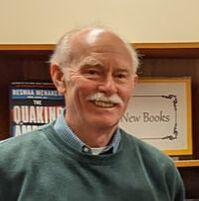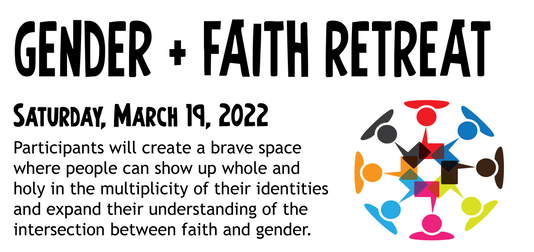|
Debbie Cushman, Clover Earl, and Merrill Aldrich for the Beloved Community Communications Team In the fall of 2019, twelve Unity Church members joined Revs. KP Hong and Lisa Friedman as the inaugural cohort of Teaching Associates. The group set off to pursue the somewhat daunting journey of becoming “resident theologians” in a new, repeating three-year program initially imagined by Revs. Rob and Janne Eller-Isaacs. Part of the impetus for this new ministry was the desire for lay leaders to support adult faith formation across the congregation. How could we best show up for the faith journey of others and our own, and be truly present within, among and beyond? This was an especially salient question back in 2019, given all the transitions anticipated over the next few years! Little did we know. As church staffing shifted, the Teaching Associates have also gratefully received support from Revs. Karen Hering, Kathy Hurt and Shay MacKay. The longer-term vision is to continue to expand and enrich our Teaching Associate cohorts such that we have a reach that can continuously supplement adult faith formation and the overall spiritual health of the congregation. Our study has focused on: foundations of UU theology, honing our interpersonal theological skills with case studies, and developing personal statements of theology. We accomplished this course of study through regular monthly meetings and small group and individual assignments. We wrestled with topics like prayer, liberalism, race, spirituality, conflict and so much more. Integration of the Double-Helix Model and ensuring that we are really digging into the intersection of faith formation and antiracist multiculturalism has also been central to our work. Here are a few examples of how we are applying ourselves right now: Clover Earl: When I first heard KP say that we were being trained as “resident theologians” I thought about heading for the door! I am so grateful I stayed because I can apply the learning of the last three years in my interactions with different groups with whom I am involved. The Hey White People, We Have Work to Do! pilgrimage came out of my work with this cohort. And the recent introduction of the Double Helix Model has deepened my understanding of how important grounding myself in personal spiritual practice is to engaging in the uncomfortable and oftentimes messy work of building beloved community. Debbie Cushman: My engagement with various small groups at Unity is so enriched by the work I’m doing as a Teaching Associate. I’m grateful to be developing a greater breadth of knowledge about our faith’s underpinnings. This supports me in providing more context for all the other curious minds and hearts around me. I have a strong interest in adult faith formation at Unity and this deeper theological grounding is key. In addition, going deep quickly and listening with compassion are necessary skills as a Chalice Circles facilitator, when welcoming participants at Finding Yourself at Unity, and in my work as a trustee. Merrill Aldrich: I have heard from many Teaching Associates how wonderful it is to get this deep dive into our complicated UU theology and history, especially with the guidance of the ministers. As I engage with other activities at the church like Worship Associates, Chalice Circles, and the Welcome Team, this grounding has become invaluable. I also love this notion of the Teaching Associates “fanning out” into the congregation, which feels right in the spirit of the way Rob and Janne Eller-Isaacs engaged with the congregation, and the larger democratic and inclusive traditions of our faith. In the 2021-22 church year, a second cohort has formed for the coming three years, and the first class is preparing to wrap up with a celebration in June. Want to learn more from an actual Teaching Associate? You can find us around the building, online, and in lots of places as our individual involvements span the work of our church community. Look for the Teaching Associate descriptor on our Unity name tags or find us by name: Merrill Aldrich, Mary Baremore, Debbie Cushman, Clover Earl, Michael Funck, Mike Huber, Susan Huehn, Mary Kerres, Barney Kujawski, Angela Wilcox, Tom Zell, Ray Hommeyer, Anna Newton, Marjorie Otto, Mary Pickard, Laura Schlatter, Michael Schwab, Valerie Tremelat, Katrina Nichols, and Laura Park. We’re ready to go deep quickly with you. Top row: Michael Funck, Susan Huehn, Debbie Cushman, Merrill Aldrich, KP Hong. Bottom row: Mike Huber, Mary Baremore, Angela Wilcox
1 Comment
Becky Gonzalez-Campoy, Beloved Community Communications Team “Somatic instead of semantic” is how one participant in Unity’s recent Gender + Faith Retreat described her experience. Instead of focusing on labels and words, people shared how gender defines their lives, determining what they can freely do and what they canNOT safely do. Thirty people spanning gender identities and several decades in age came together on Saturday, March 19, 2022, to spend the day in a retreat unlike any other Unity has offered. Rather than holding a men’s, women’s, or queer gathering, this event created a safe space for non-binary, queer, and cisgendered members of Unity Church to explore together how gender and faith intersect in their lives. Registrants completed an interest and demographic survey as well as some reading homework prior to attending to ensure that everyone arrived ready to start on the same page. Three congregants and three staff members spent 11 weeks planning this event that invited participants to explore their own gender and share on equal footing. They blended movement exercises with conversation. “We didn’t want this to be head space,” explained Laura Park, Unity’s Director of Membership and Hospitality. “We wanted it to be heart space.” Retreat organizers invited outside consultant Max Brumberg-Kraus from United Theological Seminary of the Twin Cities to lead the group in exercises to open their hearts and minds to the similarities and differences in their stories. First, Brumberg-Kraus had participants read various verses of Song of Solomon from the Hebrew Bible. “He asked us to assign a gender to each speaker of these verses,” said Sara Ford, one of the event planners and a participant. This activity opened their eyes to how easily we assume gender without thinking. Next, participants practiced four body movement exercises to reveal experiences of gender assignment that often interfere with someone’s true identity. “Max had us act out an activity we loved doing as a child that ran counter to others’ expectations of who we should be,” said Ford. “I mimed climbing trees.” Then the rest of the individual’s group mirrored that action to the person demonstrating their activity. Seeing one’s memory reflected turned out to be a powerful and healing tool. Ford noted how this exercise revealed an unconscious increase in physical fluidity for some when they were back in a favorite place, and this time others welcomed and accepted them for who they are. “It felt like a gift sharing my four movements,” said finn schneider, another congregant planner and participant. “The exercises embodied memory work that accessed the complicated relationship with gender.” Everyone journaled about their experiences afterward. Ford realized how she herself was guilty of making assumptions about herself based on appearance. “I remember auditioning for one of Unity’s choirs, certain that I was an alto or a tenor,” she said. “When Ahmed [Unity’s Director of Music Ministries] said I fit best as a soprano, at first, I was insulted. Then I realized he was focusing solely on my vocal cords, nothing else.” The movement-based format eased queer and non-binary participants’ initial concern that they would be educating curious cisgender folks. The exercises allowed everyone to participate on equal ground. Participants spent much of their time building a foundation of trust among the group, working toward a willingness to be vulnerable with one another. Like schneider, several of the participants were new to Unity Church. Rev. Shay McKay served as chaplain for anyone who needed pastoral care. This was not a time for answers, rather it was an opportunity to raise questions about what it means to explore gender and faith. While some evaluations yearned for more explicit activities connecting gender with faith in the retreat, other participants described the day as an integrated faith formation experience. “Faith was implicit,” said schneider. “Faith is the entry point, communicating how we enter space together. Everyone came willing to enter and stay in a possibly difficult, uncertain community."
The day concluded with an art project that captured the essence of lessons lifted up and hope for continued growth. “People came up to me after Sunday services now wanting to talk about what’s next,” said schneider. “The door is now open for further conversation,” said Ford. She noted that her children, who have completed the Our Whole Lives program talk freely about gender and sexuality while the adults typically do not. The Gender + Faith Retreat may play a pivotal role in changing that silence and making Unity a brave place to hold these gender and faith discussions beyond a retreat setting. As many said in their evaluations, one day was just a beginning and participants look forward to deepening their understanding of the gender and faith intersection in themselves and throughout the congregation in future conversations. To learn more about the intention for the retreat, view the “Gender + Faith Retreat Conversation with Ray Hommeyer, Laura Park, and Shay MacKay” video on the Unity YouTube Channel. For more information about the LBGTQ+ fellowship group at Unity, contact Laura Park, [email protected], 651-228-1456 x110. |
Topics
All
Beloved Community ResourcesUnity Justice Database
Team Dynamics House of Intersectionality Anti-Racism Resources in the Unity Libraries Collection Creative Writers of Color in Unity Libraries The History of Race Relations and Unity Church, 1850-2005 Archives
July 2024
Beloved Community Staff TeamThe Beloved Community Staff Team (BCST) strengthens and coordinates Unity’s antiracism and multicultural work, and provides opportunities for congregants and the church to grow into greater intercultural competency. We help the congregation ground itself in the understanding of antiracism and multiculturalism as a core part of faith formation. We support Unity’s efforts to expand our collective capacity to imagine and build the Beloved Community. Here, we share the stories of this journey — the struggles, the questions, and the collaborations — both at Unity and in the wider world.
The current members of the Beloved Community Staff Team include Rev. Kathleen Rolenz, Rev. KP Hong, Rev. Lara Cowtan, Drew Danielson, Laura Park, Lia Rivamonte and Angela Wilcox. |

